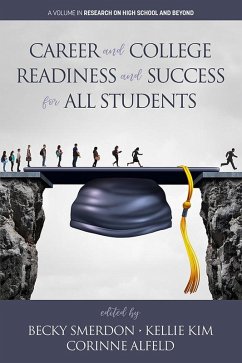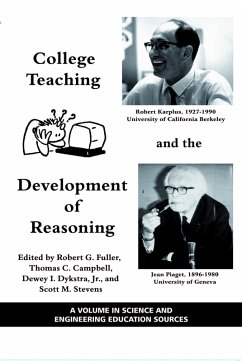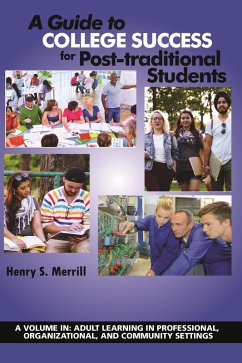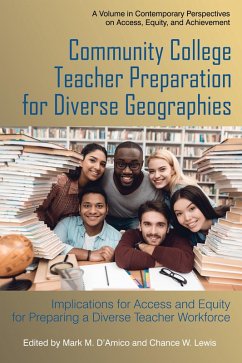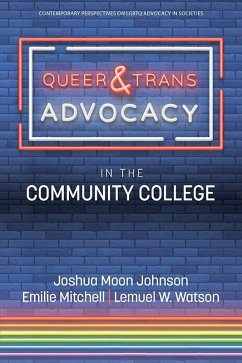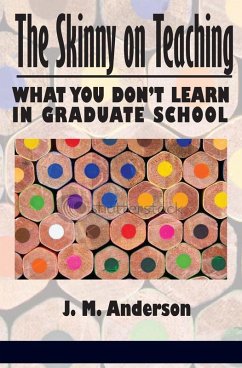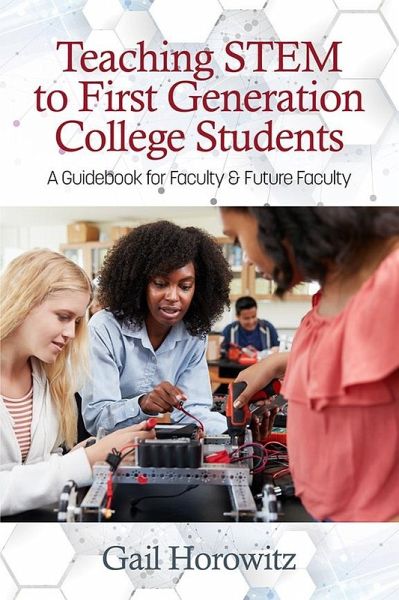
Teaching STEM to First Generation College Students (eBook, ePUB)
Versandkostenfrei!
Sofort per Download lieferbar
39,95 €
inkl. MwSt.
Weitere Ausgaben:

PAYBACK Punkte
20 °P sammeln!
Do you ever feel like more and more of your students come to your classroom not knowing how to study or what to do in order to be successful in your class? Some students come to college knowing the ropes, knowing what it takes to be successful as STEM students. But many do not. Research shows that students who are the first-generation in their family to attend or complete college are likely to arrive at your classroom not knowing what it takes to be successful. And data shows that more first-generation students are likely to be arriving on your doorstep in the near future. What can you do to h...
Do you ever feel like more and more of your students come to your classroom not knowing how to study or what to do in order to be successful in your class? Some students come to college knowing the ropes, knowing what it takes to be successful as STEM students. But many do not. Research shows that students who are the first-generation in their family to attend or complete college are likely to arrive at your classroom not knowing what it takes to be successful. And data shows that more first-generation students are likely to be arriving on your doorstep in the near future. What can you do to help these students be successful?This book can provide you with some research based methods that are quick, easy, and effortless. These are steps that you can take to help first-generation college students succeed without having to change the way you teach.Why put in this effort in the first place? The payoff is truly worth it. First-generation college students are frequently low-income students and from ethnic groups underrepresented in STEM. With a little effort, you can enhance the retention of underrepresented groups in your discipline, at your institution and play a role in national efforts to enhance diversity in STEM.This book provides an excellent description of dealing with immigrant and first generation college STEM students whose socioeconomic backgrounds often hinder them from reaching their full potential. The text touches on various aspects of student, faculty and mentor interaction that will lead to the exploitation of the student natural talents and provide life changing outcomes. Paris Svoronos, Ph.D.Queensborough Community College of CUNYGail Horowitz's new book Teaching STEM to First Generation College Students is a timely and important resource to improve the success of college students who come from families with little or no experience in the US higher education system. "First-gens" are a growing population whose academic success is important to both the institutions they attend and our nation's economy. Dr. Horowitz, an experienced chemistry educator, describes in detail the challenges first-gens face in historically difficult STEM classes. In doing so, she is honest but also optimistic. First-gens encounter difficulty not merely with the technical subject matter they may have been poorly prepared for in high school, but also with their own wrong-headed beliefs about how to study and where to find help on campus. At the same time, Horowitz is also highly respectful of the strengths that many first-gens bring to college, strengths often under the radar of instructors who may only see inexplicable behaviors they attribute to first-gens being clueless, unmotivated, or irresponsible. Horowitz provides an excellent review of constructs from psychology about students' and teachers' beliefs about academic success and failure, demonstrating that first gens are too often tripped by self-defeating and often incorrect beliefs about their legitimacy as college students and what it takes to pass difficult STEM courses. These, she explains, fuel first-gen students' fear about revealing their ignorance and illegitimacy as college students. With clear-eyed and experienced-based optimism about techniques that help first-gens succeed, she then gives excellent, specific suggestions for faculty, graduate teaching assistants, and the students themselves to help first-gens learn to "do" STEM courses and college successfully. This is an important and highly-recommended book, a gift of honesty and hope, by an experienced STEM instructor who clearly cares deeply about first-gen students and their college experience. Dr. Louise HainlineCUNY - Brooklyn CollegeDirector, Center for Achievement in Science Education (CASE)Director of NYS Collegiate Science and Technology Entry Program (CSTEP)Director of NIH Minority Access to Research Careers (MARC)Director, NSF Improving Undergraduate STEM Education (IUSE) Peer-Assisted Team Research program Director, Brooklyn College subcontract, NSF Institutional Research and Academic Career Development Awards (IRACDA) to SUNY Stony BrookAs the college population becomes more diverse, STEM instructors have a responsibility to cultivate the success of all students. In this important and engaging book, Gail Horowitz provides a valuable resource for understanding the educational experiences of first-generation students and why they often struggle in STEM courses. The author persuasively conveys two important insights. First, that first-generation students can achieve success in STEM courses by becoming self-regulated learners. Second, that college faculty and graduate instructors can easily introduce effective learning strategies into their courses. These arguments are supported by extensive references to the research literature, which provide a wealth of additional resources. Just as important, however, is the deep humanity that the author brings to her subject-a sincere belief that our classrooms and colleges are made better by the aspirations, resilience, and experiences of first-generation students. Dr. Trace JordanNew York UniversityG. Horowitz's book should be required reading for both teachers and students. It provides valuable insights into the behaviors and coping mechanisms of not only many first-generation college students, but also continuing generation students who struggle with STEM coursework. Recognizing these behaviors and mindsets is the first step towards becoming a better educator. Leda Lee, M.S.Brooklyn College
Dieser Download kann aus rechtlichen Gründen nur mit Rechnungsadresse in A, B, BG, CY, CZ, D, DK, EW, E, FIN, F, GR, HR, H, IRL, I, LT, L, LR, M, NL, PL, P, R, S, SLO, SK ausgeliefert werden.




